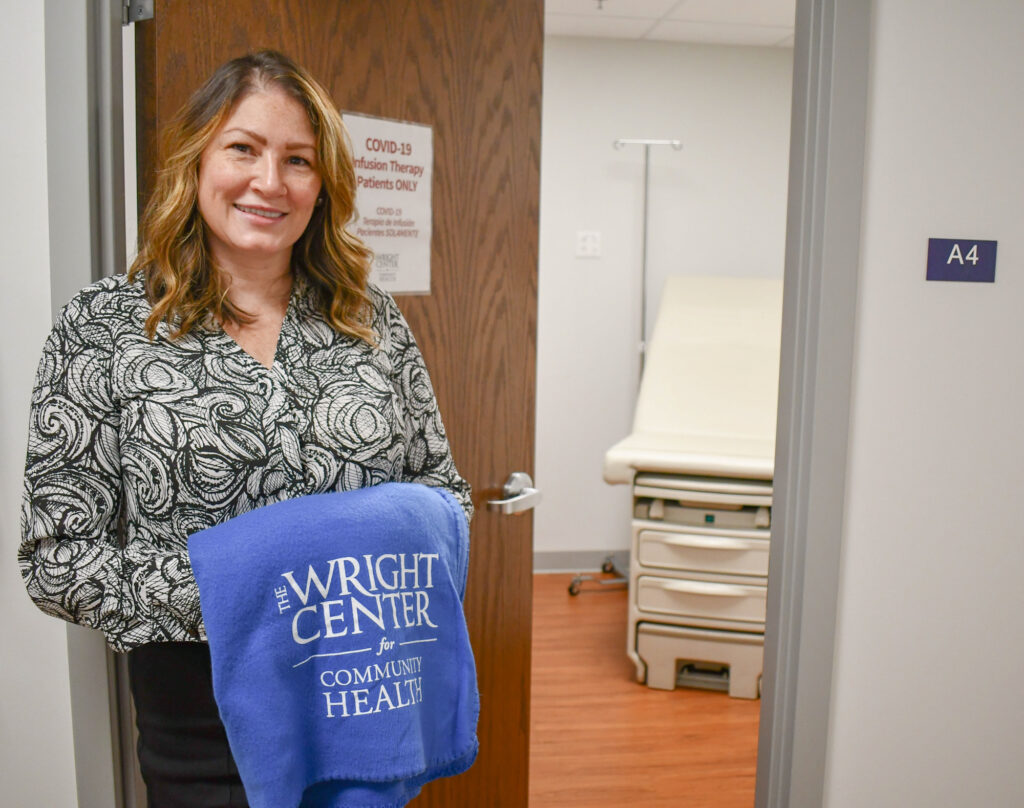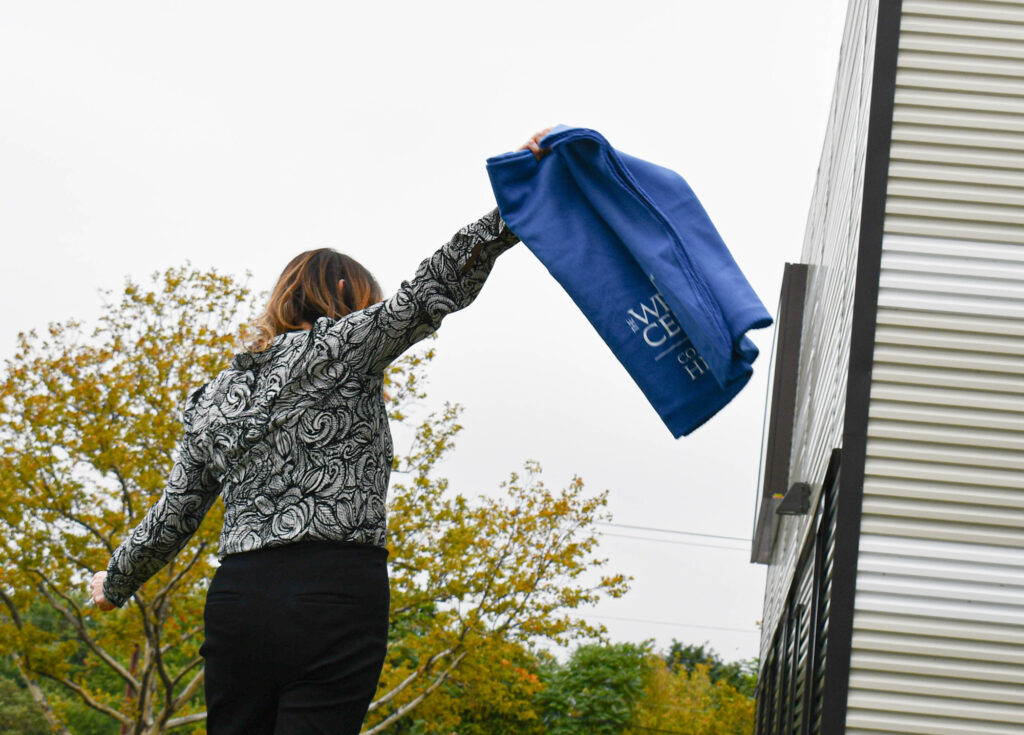News
The ‘amazing’ power of monoclonal antibody infusion therapy
COVID-19 treatment helps Wright Center patients feel better faster and stay out of hospital
Weakened and barely able to walk, Kimberly McGoff arrived at The Wright Center for Community Health’s Mid Valley Practice with a distressing diagnosis of COVID-19 and another big reason to worry.
Kimberly copes with lupus and related conditions that severely limit her immune system’s ability to fight disease, putting her at increased risk from the potentially fatal virus.
It was a scorching day in August 2021. Yet Kimberly burrowed deeper into a winter coat, hoping to stop her body from shaking. Her husband and a few concerned Wright Center employees helped her to shuffle into the Jermyn clinic, where she had an appointment to receive a treatment that, for Kimberly and other high-risk patients, can seem like a miracle.
Called COVID-19 infusion therapy, it has been shown to lessen the severity of symptoms for certain patients, potentially quickening their recoveries, preventing hospitalizations and saving lives. The Wright Center began offering the therapy in mid-January 2021 and has so far infused more than 200 patients – many of whom report experiencing sudden, dramatic improvement.
“I immediately felt better,” recalls Kimberly, a resident of Spring Brook. “I couldn’t walk into the room by myself, but I was able to get up, take my Wright Center blanket and walk out. Infusion therapy is an amazing thing. I don’t know what’s in it, but it’s amazing.”
COVID-19 infusion therapy contains virus-fighting proteins known as monoclonal antibodies. These antibodies are made in a laboratory to target a particular invader, in this case, the novel coronavirus. However, monoclonal antibodies perform the same defense function as a healthy person’s naturally occurring antibodies: identifying invaders, then latching onto and destroying them.
The therapy is a one-time treatment. Delivered via an intravenous infusion, it can easily be administered in outpatient settings such as a doctor’s office. A patient typically will spend much of the appointment reclining on an exam table or in a comfortable chair, not unlike a visit to a blood-donation center. The entire appointment generally takes about two hours.
Among those eligible to receive the therapy are seniors, ages 65 and older, with mild to moderate COVID symptoms. Younger patients, ages 12 to 64, also are candidates if they have an underlying health condition such as a chronic lung disease (including moderate to severe asthma, cystic fibrosis and COPD), cardiovascular disease or hypertension, chronic kidney disease, diabetes, sickle cell disease and obesity. The Wright Center has streamlined its referral process so that if a patient tests positive for COVID-19 at any of our primary care practice locations in Northeast Pennsylvania, the individual can be immediately scheduled for infusion therapy.
In one instance, The Wright Center provided COVID-19 infusion therapy at an off-site location – treating nine residents of a Scranton-area senior living community in a single day. All of those residents have dementia, and some experience agitation, which posed extra challenges to the care team, recalls Sheila Ford, R.N., associate vice president of clinical quality and patient safety.
“Not one of those patients wound up in the hospital,” she says, calling the situation “a historic event for The Wright Center and our collaboration in the community.”
The U.S. Food and Drug Administration granted emergency use authorization amid the pandemic to a handful of COVID-19 monoclonal antibody therapies. As with any medicines, they come with potential side effects, including allergic reactions and infection at the intravenous site.
Bryan Refice, The Wright Center’s employee health nurse and credentialing coordinator, advises coworkers about the therapy if they test COVID-positive. “Since we began offering the therapy earlier this year, we haven’t had any emergencies,” he says. “In some cases, people have even said to us, ‘I believe you saved my life.’”

Infusion therapy must be administered within 10 days after a patient’s symptoms first emerge and/or after a positive COVID-19 diagnosis. “We prefer to get you infused within the first 48 hours after testing positive, just so your symptoms don’t worsen,” Bryan says.
‘I was so scared’
For Kimberly, 50, who is a Wright Center employee and a North Pocono High School graduate, her symptoms started mildly on a Monday morning, with watery eyes, and soon steamrolled. By that evening, she had a pounding headache. Then fatigue. Overnight, she awoke with chills and took her temperature: 102.9 degrees.
“Automatically, I just got up, took my pillow, went to another room and shut the door,” she says. “In the morning, I sent my husband a text message saying, ‘I’m pretty sure I have COVID.’ I was so scared.”

Arriving for her infusion therapy appointment, Kimberly could sense her condition getting worse. She briefly felt as if she might pass out. Then, the infusion process began. “The process is easy and quick,” she says. “By the time the infusion was over, I felt so good. On a scale of zero to 100, I was 20 when I went into the clinic. And when I left, I felt like 50.”
Kimberly has since recovered and returned to work, providing her colleagues with a powerful daily reminder that, thanks to vaccines, infusion therapy and other treatments, they are not defenseless against the pandemic.
For more information about COVID-19 infusion therapy or to schedule an appointment, visit TheWrightCenter.org/covid-19/ or call 570-230-0019.








